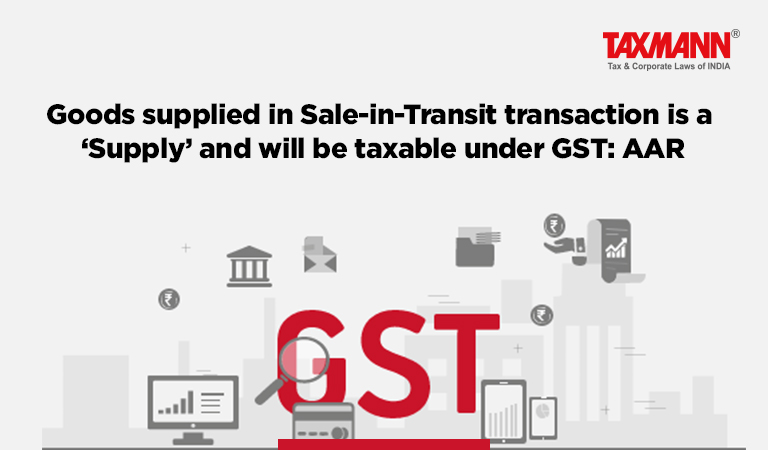Goods supplied in Sale-in-Transit transaction is a ‘Supply’ and will be taxable under GST: AAR
- Blog|News|GST & Customs|
- 2 Min Read
- By Taxmann
- |
- Last Updated on 10 November, 2021

Case Details: Authority for Advance Rulings, Tamilnadu Andritz Hydro (P.) Ltd., In re - [2021] 131 taxmann.com 336 (AAR - TAMILNADU)
Judiciary and Counsel Details
-
- Senthilvelavan B. and T.M.T. Padmavathi T., Member
Facts of the Case
The applicant entered into a contract with Tamil Nadu Generation and Distribution Corporation Ltd. (TANGEDCO) to supply new components, tool, tackles, spares and such other materials. For the purpose, the applicant, inter alia, purchased components from various vendors located outside the State of Tamil Nadu and transferred the title of the components to TANGEDCO while the goods were in transit as per contract conditions and the goods were delivered at the project site by the vendors of the applicant. It filed an application for advance ruling to determine whether supply of goods undertaken in course of Sale-in-Transit, i.e., supply undertaken when the goods are in movement from one State to another is exempt under the GST regime.
AAR Held
The Authority for Advance Ruling observed that the applicant purchased the components which would be a ‘supply’; wherein the applicant was the recipient and thereupon it transferred the title to TANGEDCO, i.e., made the supply of the components to TANGEDCO as per the contract conditions. The goods were delivered at the project site by the vendors of the applicant. In the GST regime, every limb of supply with/between a supplier and receiver would be considered as a supply. However, in the pre-GST regime, such transactions, inter-State, were exempted subjected to certain conditions as per Central Act. Therefore, the components which were supplied in Sale-in-Transit transaction by the applicant to its customer (TANGEDCO) in Tamil Nadu would a ‘supply’ as per section 7 of the GST Act and would attract levy of GST.
List of Cases Referred to
-
- Abbott Healthcare (P.) Ltd. v. CCT 2020 (34) GSTL 579 (Ker.) (para 3.4)
- Sutherland Mortgage Services Inc. v. Pr. Commissioner [2020] 115 taxmann.com 82 (Ker.) (para 3.4)
- Bank of Nova Scotia, In re [2019] 102 taxmann.com 38/72 GST 607 (AAR – Tamilnadu) (para 3.4).
Disclaimer: The content/information published on the website is only for general information of the user and shall not be construed as legal advice. While the Taxmann has exercised reasonable efforts to ensure the veracity of information/content published, Taxmann shall be under no liability in any manner whatsoever for incorrect information, if any.

Taxmann Publications has a dedicated in-house Research & Editorial Team. This team consists of a team of Chartered Accountants, Company Secretaries, and Lawyers. This team works under the guidance and supervision of editor-in-chief Mr Rakesh Bhargava.
The Research and Editorial Team is responsible for developing reliable and accurate content for the readers. The team follows the six-sigma approach to achieve the benchmark of zero error in its publications and research platforms. The team ensures that the following publication guidelines are thoroughly followed while developing the content:
- The statutory material is obtained only from the authorized and reliable sources
- All the latest developments in the judicial and legislative fields are covered
- Prepare the analytical write-ups on current, controversial, and important issues to help the readers to understand the concept and its implications
- Every content published by Taxmann is complete, accurate and lucid
- All evidence-based statements are supported with proper reference to Section, Circular No., Notification No. or citations
- The golden rules of grammar, style and consistency are thoroughly followed
- Font and size that’s easy to read and remain consistent across all imprint and digital publications are applied



 CA | CS | CMA
CA | CS | CMA
